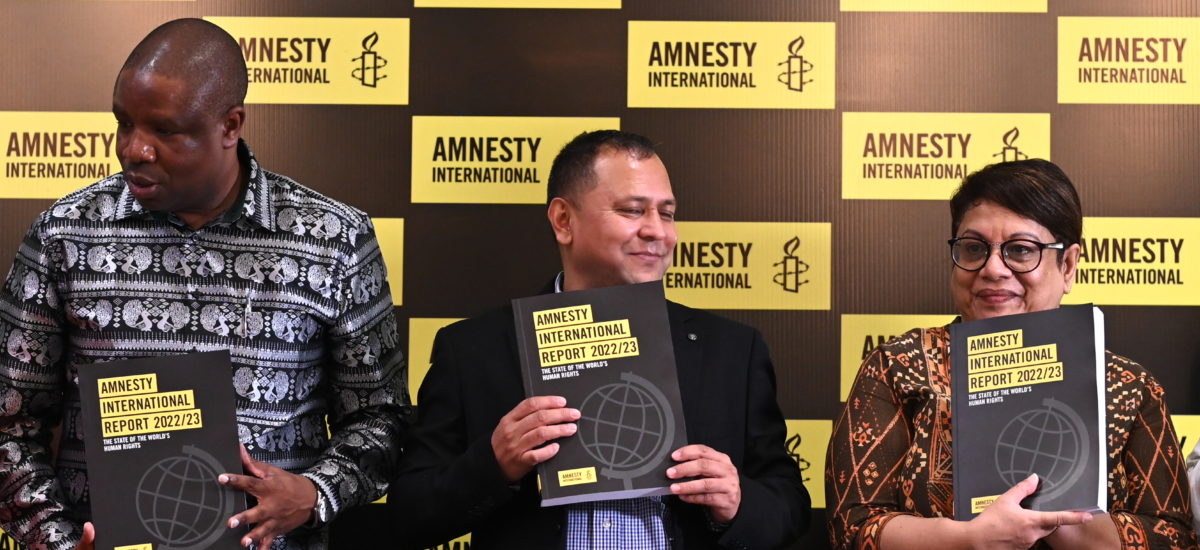Photo courtesy of Rekha Nilukshi Herath
The ruthless repression of dissent, the growing crisis of refugees, an unchecked climate crisis and double standards of the West on human rights violations were some of the issues facing South Asia and highlighted in Amnesty International’s Annual Report 2022/23: The State of the World’s Human Rights launched in Colombo.
Speaking at the launch Senior Director of Amnesty International, Deprose Muchena, said that Amnesty International would hold the West accountable for its double standards approach to human rights violations in Sri Lanka.
“We cannot allow states to use human rights violations as a tool for diplomatic trade off. The reason we decided to launch this year’s report in Colombo is to bring the attention to the deteriorating human rights conditions in Sri Lanka that the West has been selective of depending on which regime is in power,” he said.
Mr. Muchena went on to highlight the Sri Lankan government’s lack of commitment to protect human rights and civil liberties of its citizens and the need to protect peaceful protesters and civil rights activists. He said that the government and police should not be compelled to use minimum force at protests simply because there were observers from international organisations such as Amnesty International but because they were truly committed to exercise their use of force while understanding the importance of upholding the rights of civilians.
Mr. Muchena said Amnesty International would deploy more observers at future protests, adding that the right to protest must be protected not only in Colombo but especially in the North and the East where dissent had been repressed for decades.
The Amnesty International report found that double standards on human rights abuses were taking place around the world fuelled impunity and instability, including deplorable lack of meaningful action on the plummeting human rights record in Afghanistan, inadequate responses to a spiralling economic crisis in Sri Lanka and the refusal to confront the crackdown on dissent and persecution of minorities in multiple South Asian countries, an Amnesty International press release said.
“As South Asia sits on the brink of a volatile and unpredictable future, it is important now, more than ever, to keep rights squarely in the centre of all negotiations and conversations,” said Mr Muchena.
People took to the streets across the region to protest against injustice, deprivation and discrimination but in most countries including Afghanistan, Bangladesh, India, Nepal, Maldives, Pakistan and Sri Lanka they were met with intense crackdowns and excessive, sometimes lethal, force, the press release said.
In Sri Lanka, emergency powers were used to curtail mass protests. The police used live ammunition, tear gas and water cannon against largely peaceful crowds protesting against the spiralling economic crisis, causing deaths and injuries. Protesters in Sri Lanka were arrested, arbitrarily detained and charged with terror-related and other offences, the press release said.
“South Asian countries seem to apply human rights law on a selective basis in a staggering show of blatant hypocrisy and double standards. They only criticize human rights violations when it aligns with their global and regional politics but are mute spectators to similar abuses at their own doorstep just because their interests are at stake. It is unconscionable and undermines the entire fabric of universal human rights,” said Yamini Mishra, Regional Director for South Asia at Amnesty International.
Violence against women also remained prevalent in the region. “Women have been at the forefront of protests in the region, often challenging patriarchal control over their bodies, lives, choices and sexuality on behalf of the state, society and family. The failure of States and institutions to uphold gender justice leaves a terrible legacy of suppression, violence and stunted potential,” said Ms. Mishra.
Economic crises fuelled by pandemic-related recession, economic mismanagement and climate change induced disasters within and beyond the region severely affected economic and social rights, including in Afghanistan and Sri Lanka, where food, healthcare and an adequate standard of living became increasingly inaccessible. In Sri Lanka, inflation exceeded 73% in September 2022 with the poorest and most marginalized suffering the greatest consequences, the press release said.
“South Asia is besieged by an onslaught of intersecting and interconnected crises including ‘man-made’ crises – with at least three countries in the region in the middle of an economic crisis and burdened with high debts – and natural crises, with South Asia often being ground zero for extreme heatwaves to destructive widespread floods. We stand no chance of surviving these crises if our national and international institutions aren’t fit for purpose,” said Ms. Mishra.
Amnesty International called for the UN’s key decision making body, the Security Council, to be reformed to give a voice to countries and situations which have been traditionally ignored, especially in the global south, the press release said.
“There is no denying that an effective and consistently applied rules-based international order is the need of the hour. The Russian war of aggression in Ukraine demonstrated that some of the richest countries in the world were more than capable of receiving large numbers of people seeking safety and giving them access to health, education and accommodation. However, the West did not offer the same treatment to the Afghans and Rohingyas escaping war and repression. This shameless double standard must be challenged and countries must step up their efforts for a renewed rules-based order,” said Mr. Muchena.
“The double standards of wealthy nations are as evident in their sickening COVID-19 vaccine nationalism as it is in their large contribution to climate change. As South Asia increasingly becomes ground zero for many climate emergencies, it further highlights the need for reparations for loss and damage in these nations with greater investment in global reduction in dependency on fossil fuels. We also need countries, including in South Asia, that have so far failed to take a stand against human rights abuses in the world to speak up now before it is too late for everyone, everywhere,” he said.

